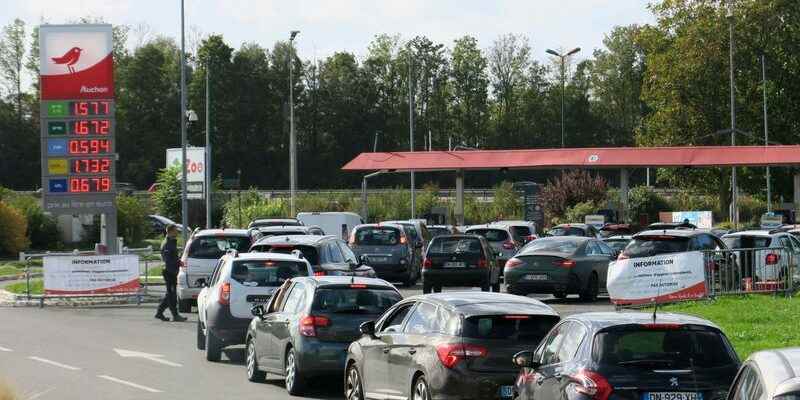PARIS/PRAGUE (Reuters) – Emmanuel Macron on Friday called on the French to be “calm” in the face of fuel shortages in the country, mainly in Ile-de-France and Hauts-de-France, and urged “responsibility” the employees of TotalEnergies and ExxonMobil on strike for wage increases.
Speaking at a press conference at the end of the European summit in Prague, the head of state said he was hopeful that the wage negotiations would succeed in the two groups.
The at least occasional shortages of gasoline, which had started in Hauts-de-France, in the North, have spread in recent days and now concern some 20% of service stations at the national level, according to the government.
“I know today the concern that there is among many of our compatriots, in particular in Ile-de-France and in Hauts-de-France, with regard to their ability to fill up with petrol. I want to have a message (…) of call for calm”, declared Emmanuel Macron.
Emphasizing that the phenomenon was “purely linked to [d]social movements”, he noted “panic behavior” which, according to him, has no place.
“I call on each and everyone to be responsible because we are a people of united compatriots, I think that all wage demands are legitimate but they must not prevent each other from being able to live, to circulate”, continued Emmanuel Macron.
“I am confident in the ability of these two groups to finalize their salary discussions,” he said, before launching: “Don’t panic!”
“WE WILL NOT FORGET YOU”
In an internal communication sent to employees that Reuters obtained, the management of TotalEnergies promises “a fair reward” for its employees by the end of 2022.
She repeats that wage negotiations will begin in November, two months earlier than in previous years, and that they will focus on the “good results” of the group, wages and inflation.
“The company’s results are exceptional in 2022 and we will not forget you. All employees, all our colleagues will receive their just reward on their payslip before the end of the year”, writes its Chairman and Chief Executive Officer, Patrick Pouyanné, in communication.
The Minister for Energy Transition, Agnès Pannier-Runacher, declared Friday afternoon on the sidelines of a trip to Arras (Pas-de-Calais) that “more than 80% of the service stations in the territory are operating normally”, i.e. about 20% of stations in difficulty. Friday morning, Olivier Véran, had declared on BFM TV and RMC Info that 15% of the stations were affected by the shortage.
The government spokesman acknowledged that the weekend was going to be “tense” as the CGT promised to continue the strike which is paralyzing several refineries, including the two largest in the country, operated by TotalEnergies and ExxonMobil.
In particular, the CGT is calling for 10% wage increases for TotalEnergies employees to take into account inflation and the rising cost of living while the French energy group is making record profits.
The social movement, called to “anchor itself in the long term”, according to the CGT, reduces France’s refining capacity by 60%, or 740,000 barrels of oil per day, which requires the government to draw on its “stocks strategic” or to import gasoline.
HEAVY-DUTY VEHICLES WILL BE ABLE TO RIDE THIS WEEKEND
“I want to tell the management of companies and staff representatives who are affected by this social movement that we appeal to their responsibilities to find a solution as soon as possible”, insisted Agnès Pannier-Runacher, specifying that the government was mobilized to improve the situation.
Two measures have been taken: the release of part of the strategic stocks and the exceptional authorization granted to heavy goods vehicles to circulate this weekend.
The use of jerry cans has also been banned in Hauts-de-France, where the influx of drivers from Belgium to take advantage of cheaper gasoline than in their country has aggravated the difficulties.
Tensions on supply are also accentuated by the rebate granted by TotalEnergies, which caused a rush to the group’s service stations, noted Olivier Véran.
The government spokesman ruled out requisitioning the refineries, as suggested by the president of the Hauts-de-France region, Xavier Bertrand, promising instead to draw more from the country’s strategic stocks if the situation requires it. .
A spokesperson for the French Union of Petroleum Industries (Ufip) told Reuters that as long as the problem remains logistical, France’s strategic reserves are not affected, thanks to a communicating vessels effect between the regions which have a one-time need for gasoline and those who have a surplus.
Strategic stocks guarantee France to have three months of fuel consumption in advance.
(Report by Sudip Kar-Gupta, Forrest Crellin and Caroline Pailliez, with Michel Rose in Prague, written by Tangi Salaün and Sophie Louet, edited by Nicolas Delame and Matthieu Protard)
